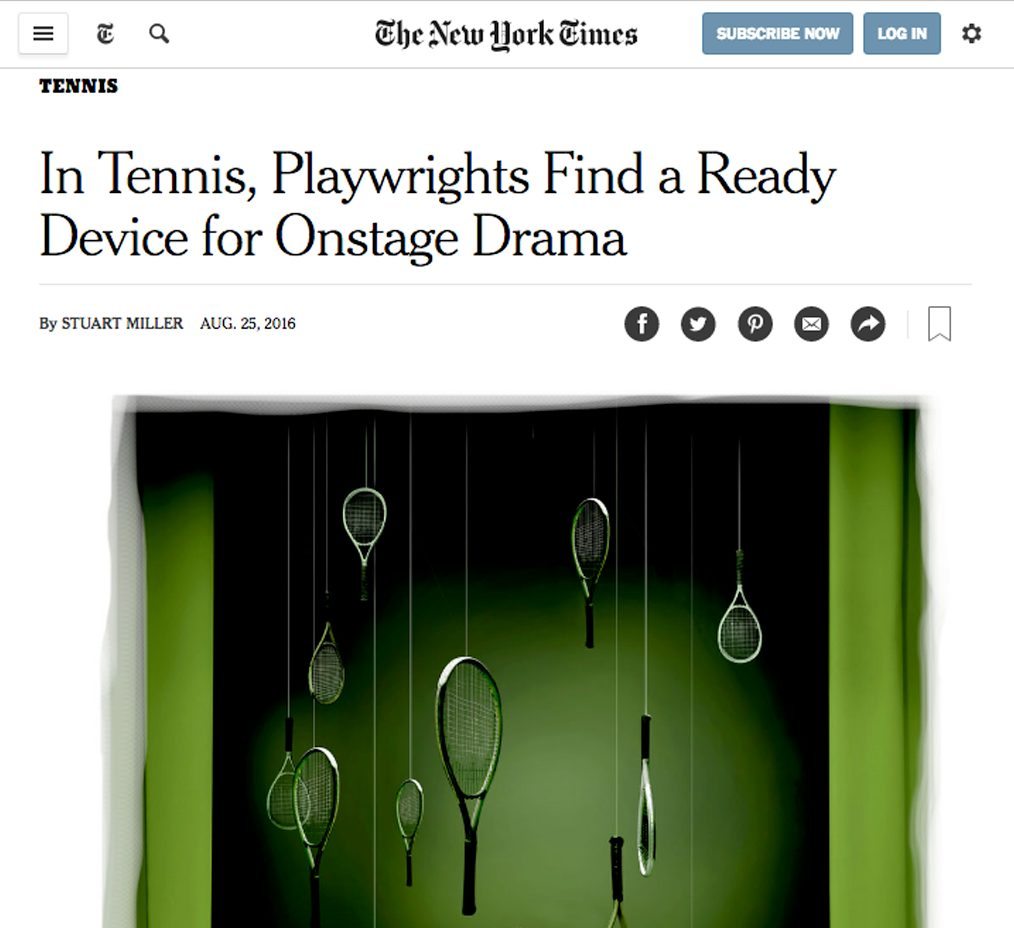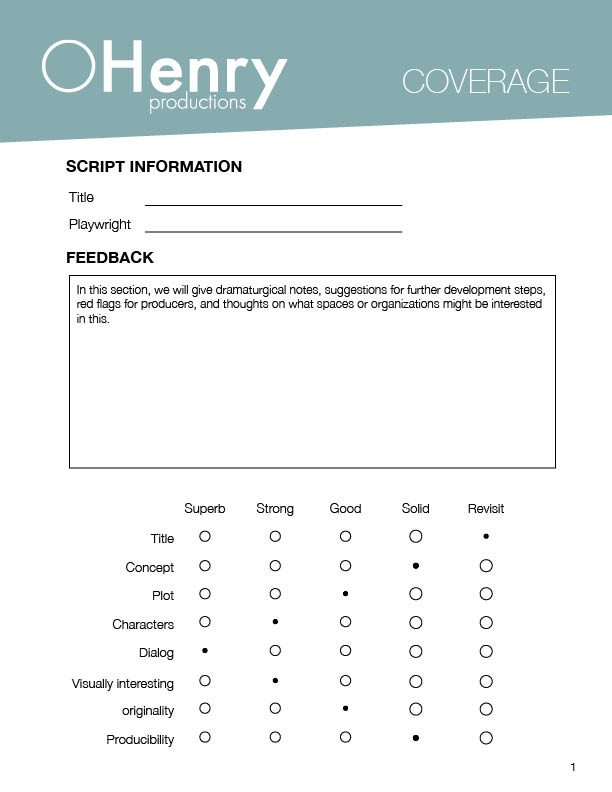In Tennis, Playwrights Find a Ready Device for Onstage Drama
August 25, 2016
Stuart Miller
 Andy Bragen raced to the net, hoping to capture a key point in the tight third-set tiebreaker. The results, initially at least, were calamitous. Mark Alhadeff whistled a passing shot by Bragen to widen his lead to 5-1. Losing the point was awful, but even worse for Bragen was the knowledge that Alhadeff was about to let loose with a self-congratulatory yell.
Andy Bragen raced to the net, hoping to capture a key point in the tight third-set tiebreaker. The results, initially at least, were calamitous. Mark Alhadeff whistled a passing shot by Bragen to widen his lead to 5-1. Losing the point was awful, but even worse for Bragen was the knowledge that Alhadeff was about to let loose with a self-congratulatory yell.
In that moment, Bragen could not tolerate the outburst, so he shouted across the net, “Don’t you say a word,” adding a vulgarity for emphasis. His opponent returned verbal fire, Bragen stomped off the court, and Alhadeff stormed home.
“Twenty minutes later he called me up, and he was sheepish, and I was sheepish,” Bragen said. “We both had talked to our girlfriends, who said, ‘What’s wrong with you?’”
All’s well that ends well, as Shakespeare might say. Bragen spent months recounting the incident to friends before turning it into a new play that takes its name from that vulgarity-laced on-court exchange. It opens in November at 59E59 Theaters.
While tennis takes center stage in New York this week with the start of the United States Open, the sport is also being depicted on stage with surprising frequency.
Sarah Ruhl’s new play, “Scenes From Court Life, or The Whipping Boy and His Prince,” will have its world premiere at Yale Repertory Theater on Sept. 30. It juxtaposes an extended early scene in which Jeb Bush and George W. Bush play highly competitive doubles with their parents with a scene in which Charles II, England’s king during the 17th century, plays royal tennis with his whipping boy.
Waiting in the wings is “The Last Match,” a play by Anna Ziegler that is set during a United States Open semifinal; it is scheduled to open in New York next year after runs in Pittsburgh and San Diego.
“An Upset,” a one-act play by David Auburn first seen in New York in 2008, is being revived around the city timed to the Open, including three shows at 99 Bowery beginning Sept. 12.
“It’s always hard to put a finger on why something is suddenly in the zeitgeist,” said Ruhl, a two-time Pulitzer Prize finalist and a Tony Award nominee. “I don’t know why it is happening with tennis in theater right now. But for me, while researching the Bush dynasty, I realized tennis is such a big part of their lives and a wonderful metaphor for family competition and sibling rivalry.”
In “Scenes From Court Life,” Greg Keller plays George W. Bush as a more shrewd politician than his brother Jeb but an inferior tennis player.
“Athletes are almost another species to playwrights,” Keller said. “The writer’s world is so subjective, but for athletes there is always a winner and a loser.”
Tennis holds undeniable appeal for the theater. For starters, it can encompass widely different settings, including the Bush family compound, the public courts of the Lower East Side and Arthur Ashe Stadium.
Tennis, Keller said, is also “one-on-one, but you are not physically touching each other like in boxing.”
He added, “You are in your own little world.”
Bragen has written other works about tennis, including a monologue called “Game, Set, Match.” He said the sport offered intimacy and isolation — great fodder for writers.
“There’s a kind of dance that I feel as a player, but you are alone in your own head at the same time you are connected to other person,” Bragen said.
Ruhl said she liked the combat mixed with decorum, “the formality within the structure of competition.”
Ryan Sweeney, who played Division I tennis at the University of California, Santa Barbara, and is producing and starring in “An Upset,” said, “Tennis is a lonely sport, and Auburn’s script touches on the players’ vulnerabilities.”
Tennis is also “a rich metaphorical landscape,” Ziegler said, whether one is writing about dynasties and power (Ruhl), the dynamics between friends and lovers or men and women (Bragen), or coming to terms with aging and the responsibilities of family (Ziegler).
“Plus, tennis is like life,” said Ziegler, whose “Photograph 51” won the award for best new play at this year’s WhatsOnStage Awards in London. “You are all alone out there, and it’s so unfair. The injustices of tennis mirror the injustices of life acutely — in tennis, you can win more points than your opponent and lose the match.
“Maybe the question is, Why isn’t everyone writing their tennis play?”
For practical purposes, no points in any of the plays will be played on stage; serves and rallies will be performed as stylized miming.
“We’re using narration and language to create the action for the audience, and it’s more exciting for it to happen in their imaginations than in a cinematic way,” said Lee Sunday Evans, the director of Bragen’s play.
In the first two productions of “The Last Match,” the actors did not even hold a racket, but they will do so in “Scenes From Court Life.” Ruhl said the director Mark Wing-Davey had wanted actors who knew how to play tennis.
It turns out there is a small but intertwined community of actors and playwrights competing on New York’s courts. Keller, the actor who plays George W. Bush, plans to take his racket to Connecticut to challenge Danny Wolohan, who plays Jeb Bush. Wolohan has played doubles tournaments in Brooklyn with the playwright Will Eno. Keller has, without incident, played against Alhadeff, who initially did readings for Bragen’s play in the part based on him.
“Mark had a loopy backhand, but after seeing it described in the play, he worked on it a great deal, and it’s better now,” said Bragen, who owns an orthodox but potent serve, a strong ground game and great court coverage but who, perhaps unsurprisingly for a playwright, can get stuck in his own head at crucial moments.
Bragen still hits with Alhadeff, although he said it had been “delicate” the first time they returned to the court. These days they rein in their emotions.
“We’re not in the caldron we were in before,” he said, now that both men have families. “I do have a kind of nostalgia for that intensity.”
Bragen indulges those emotions of “the inner 8-year-old” in the play, in which the feud grows much darker and deeper, dragging in both men’s girlfriends, who are the audience’s guides and the emotional linchpins of the play.
All the playwrights said writing the tennis scenes had come naturally.
“I wrote this at a time I was watching tennis obsessively,” said Auburn, whose play transpires in the locker room — “that’s where all the tension comes out” — after three tough matches between an aging American star and an up-and-coming Romanian.
Bragen said: “I’ve watched so much tennis over the years, the language is in my head. I think John McEnroe’s announcing is so psychologically astute, he should get some credit for these plays.”
Ziegler’s “The Last Match” pits Sergei Sergeyev, a talented and flamboyant young Russian who has not quite figured out how to win, against Tim Porter, a six-time United States Open champion who at 33 is rumored to be heading to retirement. In creating Sergeyev, Ziegler was inspired by the early career of Novak Djokovic of Serbia. Porter is an American version of Roger Federer, but both characters have hints of other players.
“Andre Agassi’s book was big for me, and Andy Roddick’s retirement speech did me in,” Ziegler said. “Watching someone at that age say goodbye to the life they’ve known made me think about what athletes go through in a much more accelerated way than the rest of us.”
Ziegler said that after she wrote the scenes between Sergeyev and his girlfriend and between Porter and his wife, the tennis scenes were suddenly invested with more emotion and higher stakes.
“You understood the intensity of the match because of what they have gone through to get to this point,” she said. “Then it became a much easier play to write.”




Join the conversation